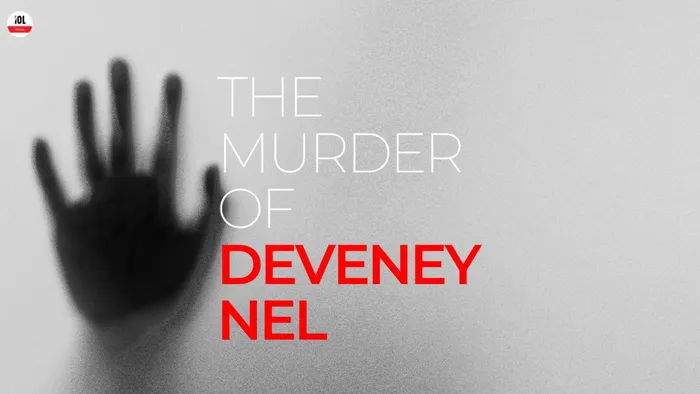Can the Deveney Nel murder-accused be tried as an adult? Experts weigh in

The accused in the Deveney Nel murder is a juvenile, but what happens if the accused turns 18 at the start or during the trial? Graphic: Kim Kay
The murder-accused in the Deveney Nel case is 17-years-old.
In all likelihood, given court proceedings and history in SA, the trial could likely only proceed when the accused turns 18.
The question is whether the accused - who for now cannot be named - will be tried and sentenced as an adult?
The lifeless body of the 16-year-old Hoërskool Overberg pupil was discovered behind locked doors of the school’s storeroom on August 14, 2024.
The pupil had been reported missing following a school sporting event.
Her alleged killer, a 17-year-old fellow pupil, was arrested two days later.
He made a brief appearance in the Caledon Magistrate’s Court in the Western Cape and was taken to a place of safety.
The matter will return to court on September 18, 2024.
South Africa is not new to child offenders. Over the years, our courts have heard multiple cases of children convicted of murder.
Some of them include a 13-year-old KZN girl who killed her father and staged his suicide because of his sexual abuse.
The court sentenced her to 10 years in jail, but the conviction was overturned by a higher court which changed the conviction to that of correctional supervision.
In 2010, Keegan Govender, who was 17-year-old when he killed a neighbour for molesting his girlfriend, was jailed for 17 years.
He and his girlfriend Michelle Nadasen, then 23, killed the man, buried him under a mango tree and then later exhumed his body before throwing it into the crocodile-infested Nseleni River on the KZN North Coast.
Govender was arrested when he was 17-years-old, and when the trial commenced, he had turned 18.
The proceedings were held in open court.
In 2012, Govender was jailed for 17 years, while Nadasen received 25 years.
Judge Mohini Murugasen found that, despite his youthful age, Govender had to be jailed.
In 2002, a 12-year-old year girl - dubbed South Africa’s youngest killer - was sentenced to house arrest and correctional supervision for killing her grandmother.
She hired two hitmen to kill the woman, citing abuse allegations. The hitmen were jailed for 25 years.
So what really happens in a case when the accused is almost an adult?
Dr Suhayfa Bhamjee, a senior lecturer at the University of KwaZulu-Natal’s School of Law, said the whole question of criminal capacity comes into play when an accused is close to becoming of adult age.
“Criminal capacity essentially asks whether a person has the cognitive ability and maturity to distinguish between right and wrong, to act in accordance with that appreciation, and also to understand the consequences of their actions.
“A person who has criminal capacity can be held criminally responsible for their actions.
“What this means is that this person can be tried, convicted etc.“
Bhamjee said this capacity requirement applies to adults and children.
“So, if a child is found to have criminal capacity, then they can potentially be held criminally responsible for their unlawful conduct.
“As far as children are concerned, our law holds that anyone under the age of 18 is a child.
“And in this regard, it is important to clear up some misconceptions about children who are in conflict with the law.”
Bhamjee said the popular nomenclature for this is ‘child offenders’, however, the preferred term in our law is ‘child in conflict with the law’.
She said the Criminal Procedure Act and the Child Justice Act work in tandem, collaboratively and synergistically to cater for offences perpetrated by children.
“The Child Justice Act creates three categories of children, with differing measures and presumptions related to criminal capacity: under 12, between 12 and 14, and 14 to 18.“
She said that while the only difference is that the matters are heard in-camera, these courts are still criminal courts.
“So, the normal requirements for determining whether the child is guilty or not, apply as they would in any other criminal trial.
“Another difference is that the names of child offenders are not to be divulged.”
Here the trial continues in-camera, the name may still not be divulged, and if the matter comes for sentence (only an option if the child is found guilty), then such a person is sentenced as per the appropriate sentence for children.
Sentencing child offenders
“There are parameters for sentencing based on the nature of the offence, for example, murder being one of the most serious offences, even when perpetrated by a child and the age of the child when the offence was committed.
“This is because a principle in our law is that a person’s liability is considered at the time at which the offence was committed, as well as other more focused and child-centric aspects of fairness, justice and legitimate focus on rehabilitation measures if appropriate as opposed to imprisonment.”
Anand Nepaul, a top Durban attorney, who has represented child offenders, said from his knowledge, the accused will be tried according to his age at the time of the trial.
“So, if the trial is delayed and commences after he becomes an adult, he will appear in the normal courts and be treated accordingly.”
His youth at the time of the offence being committed is a factor that will be taken into account during the trial.
Also echoing similar sentiments is a KwaZulu-Natal magistrate, who cannot be named, saying that if the offender turns 18, then the trial will continue as normal, meaning no rules for juveniles would apply.
“Only if he is a juvenile, proceedings be held in-camera with a guardian present at all times.
“The courts do not have different rules for child offenders when it comes to criminal proceedings. The only difference is that the court may take into consideration that he was a juvenile when the crime was committed.”
IOL News